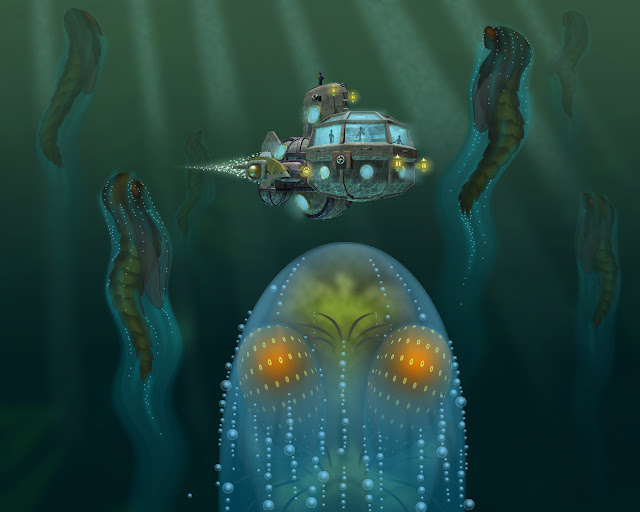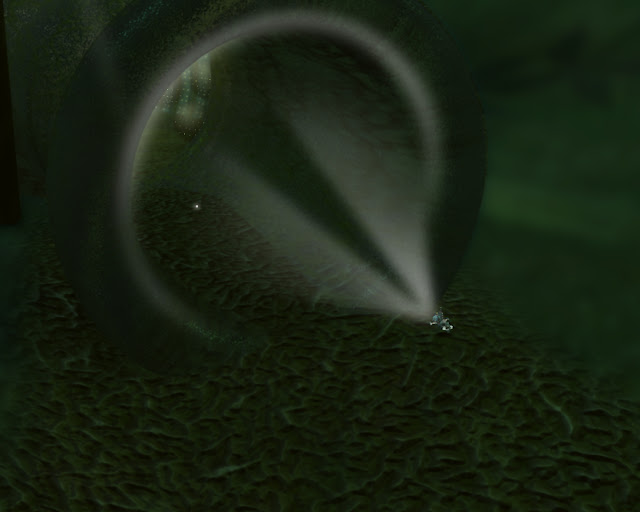The Age of Discovery, Chapter 7: The Hatch
Day 4: 0030 hours…
Before we unfurl our drift anchor
and set the ship ready for the night I order the crew to make all hatches and
other points of ingress doubly secure.
This does little to ease my anxiety. At four bells on the first watch I distribute a jigger of
whiskey to every man – to help settle nerves. This is hailed as my best command decision to date.
Day 4: 0700 hours
The crew is on edge this morning,
less congenial than normal, and I am fairly certain of the reason. Like them, the incident with the
mysterious intruder shook me to the very core of my scientific
convictions. There simply is no
explanation for the disappearance of the remains of the algal protist – no
answer to this mystery. But I feel
compelled to take action, to do something to preserve the mission and make my
ship and crew safe. I will
therefore acquiesce to my urge to put some distance between the Cyclops and this region of the pond
universe. I acknowledge that
to do so makes little sense – for the culprit is a mystery, therefore a
solution to it is a mystery as well.
It is my hope that distance will lighten our hearts and help to
reenergize our intrepid spirit.
Day 8: 0540 hours...
It has been three days since I last
penned an entry into my exploration log, but in this realm three days may as
well be three weeks. I know not
whether this is due to an anomalous time dilation created by our micro scale
existence, or a sense that we are more removed than ever from the macro
world. But it is a certainty that
as our mission takes us further and deeper into the unknown, the world of
hearth and table takes on an ethereal and distant quality, as if the micro
verse is now and has always been our true home, and we are only now realizing
it.
Last night at five bells we
completed our first crossing of the pond’s northern arm, making an average
speed of seventeen meters per day for three and a half days. Engine master Barron has been bragging
about the feat to anyone in earshot, and the rest of crew is happy to allow him
this conceit. He is normally a
reserved man, and we are all delighted to see him in this rare mood. If I allowed myself the luxury of
superstition, I would hope that this accomplishment portends good fortune for
the Cyclops and her crew.
After our recent mystery it was
unnerving to cross that fathomless track, a black void below us day and
night. On the crossing we observed
a diversity of phytoplankton, including species undoubtedly related to the old
friends that are by now quite familiar.
None of these organisms were struck or wounded by the ship, and no
specimen was brought aboard.
During the passage the Cyclops
came to the surface twice. The
first time was to transmit a wireless update of our position and status to the
receiving post back at Dragonfly Sky-base. The second visit occurred with considerably less
intention.
Excerpt from Naturalist’s Log:
At two bells on the dog watch, we had just put away the evening mess. I was on the observation deck of the pilothouse when Barron called up from the engine room to report a feedback vibration in the propeller shaft. I heard the engine order telegraph ring 4-times, indicating that Jonathan had ordered all-stop. Within seconds a vertical displacement wake off the portside sent us tumbling abeam. As the ship righted itself, another wake even stronger, threw the Cyclops end over end. I was able to gain purchase against the ladder with a clear view through the starboard porthole.
Outside, giant objects were rising up from the depths all around us. There was something familiar about this phenomenon, something I had seen on still water many times in the late spring, on country lakes and ponds in southern Vermont, when I was a girl. I knew immediately what was happening.
As soon as the ship steadied herself I hurried down to the observation deck to report. I found Jonathan helping Gyro with the wheel, meaning that the ship’s rudder was being slammed by the turbulence. Through his clenched jaw Jonathan asked if I had any idea what was going on outside. I explained that we were caught in the middle of an insect hatch, a warm season occurrence in temperate wetlands when an entire population of insects emerges from its aquatic pupa stage, rises to the surface en mass, and takes to the air as flying adults of the species. The huge columns of turbulence outside were insect pupae, rising to the surface!
As entered by Lyra Saunders, MS Cyclops
No sooner has Lyra delivered her
report, than the deck begains to tremble, each small vibration building upon
the previous one, a crescendo that can only culminate in catastrophe. I barely have time to give the order to
makefast all steering surfaces. As
the crash shutters are closing over the windows of the observation deck we are
thrown to the floor as upward acceleration presses us into the floor. It is as if a huge elevator is lifting
the entire ship rapidly upward, but more powerfully than any I have ever
experienced, even in the modern lifts in the towering twenty-story skyscrapers
of New York and Chicago. And then…
I am floating above that same deck
in a state of freefall. Gravity is
no more. Gyro, clutches the
ship’s wheel, stares over his shoulder at me with dismay with saucer eyes. I’m sure my expression of one of equal consternation.
“Skipper!” shouts Lyra. But before she can complete her
sentence we were slammed back to the deck, and our ears assaulted with the
sound of metal complaining.
Then all is still. The deck cants several degrees to
starboard. The Edison lamps
flicker, then go dark. Rays of
golden daylight stabb into the darkened pilothouse through watch-holes in the
crash shutters.
“Where are we?” asks Gyro.
I press my face to the
watch-hole. We are surrounded by
sunshine, unfiltered by water. I give
the orders to open the crash shutters.
The Cyclops is resting on the impenetrable surface of the endless pond
– a featureless plane that extends to a hazy indefinite horizon. And we are stranded upon that
unbreakable expanse, as solid as stone to us. Unless we find the means to break through the water’s
surface tension, we are stuck, with no way to resume our journey.




Comments
Post a Comment